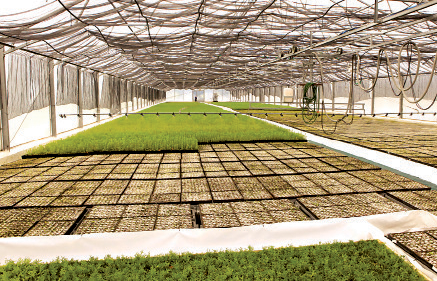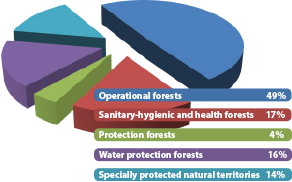Starting from 2015, forest utilisation in Belarus has to reach the standards of advanced economies, primarily Finland. President Alexander Lukashenko gave the relevant instructions as he visited the Republican forestry breeding and seed production centre.

In the Republican forestry breeding and seed production centre
Belarus is among the top ten European countries that are rich in forest resources, occupying over 39 percent of the territory of our country. However, we do not always use this benefit rationally — we don’t harvest all the ripe wood on time and trade our raw materials.
After hearing the report from the Forestry Minister, Mikhail Amelyanovich, about the achievements, problems and prospects of the industry, the President asked him which country is currently the most efficient from the point of view of forest management. The Minister mentioned Finland and immediately received the instruction from Alexander Lukashenko, “Let’s agree that, starting from next year, we work only the way they do it in Finland, using integrated approaches for cultivation and growing technologies. It’s high time to stop this robbery in the forest.”
The President reminded that when he appointed Mikhail Amelyanovich Forestry Minister four years ago, he gave instructions to study forest utilisation practices of advanced economies and to assimilate the best practices in Belarus.
“The entire process flow has to be compliant with the highest standards. Only these kinds of workflow organisations and industrial standards must be practiced starting from next year. We need order in the forest. It is our legacy,” emphasised the President.
 The Head of State said that the same kind of standards should be sought, as far as the economic side of the forestry industry is concerned. In recent years, much has changed for the better: due to the launch of new technologies, revenue from sales has increased while budgetary subsidies for forest management have fallen. For example, over the last three years, their specific weight in the total amount of expenditures has reduced to 34 percent from 41 percent.
The Head of State said that the same kind of standards should be sought, as far as the economic side of the forestry industry is concerned. In recent years, much has changed for the better: due to the launch of new technologies, revenue from sales has increased while budgetary subsidies for forest management have fallen. For example, over the last three years, their specific weight in the total amount of expenditures has reduced to 34 percent from 41 percent.Meanwhile, not all opportunities are used in the branch to secure good revenue. For example, not all timber is processed in the country. According to Mr. Amelyanovich, $140 million worth of low-grade wood was sold abroad in 2013 while $90 million was sold over the first six months of this year. Yes, this is low-quality raw material, but it’s also able to bring economic benefit.
The President asked the Minister a reasonable question. “If capitalists pay you $150 million for this trash, it means they need it and they make good money on it. Why cannot we do the same? Let’s agree: you will continue doing what you do this year and the next; however, starting from 2016, you will no longer sell timber to other countries. You will stop exporting raw materials starting from January 1st, 2016! Only products with a high added value can be exported.”
Actually, the country is conducting a large-scale modernisation of timber processing enterprises, aimed at solving this task. In order to completely load them with domestic raw materials, scientists are actively liaising with forestry workers. The President has recently been shown a bio-technical laboratory, founded on the premises of the Republican forestry breeding and seed production centre in co-operation with Polesie State University. It has launched Belarus’ first technology of cloning of hardy-shrub species, giving colossal advantages in growing stocking material. The period of creation of seed plantations has reduced from 15 to 3-5 years.
Mr. Lukashenko pointed out that a wide range of forest-harvesting machines had been created in Belarus. According to Alexander Shakutin, Chairman of the Board of Directors of Amkodor Holding Managing Company JSC, the company started manufacturing machines for the forestry industry in 2006. Since then, the company has mastered the production of 17 models. The localisation level is roughly 60 percent, but it is supposed to reach 90 percent within the next two years. The Forestry Minister remarked that the industry’s retooling allowed increasing forest harvesting of up to nearly 11 million cubic metres of timber in 2013. Moreover, multifunction forest harvesters were used to secure 34 percent of the total harvested volume.
Amkodor’s product range was demonstrated before Mr. Lukashenko, and the President was pleased with what he saw, but gave those instructions to raise the localisation level.











